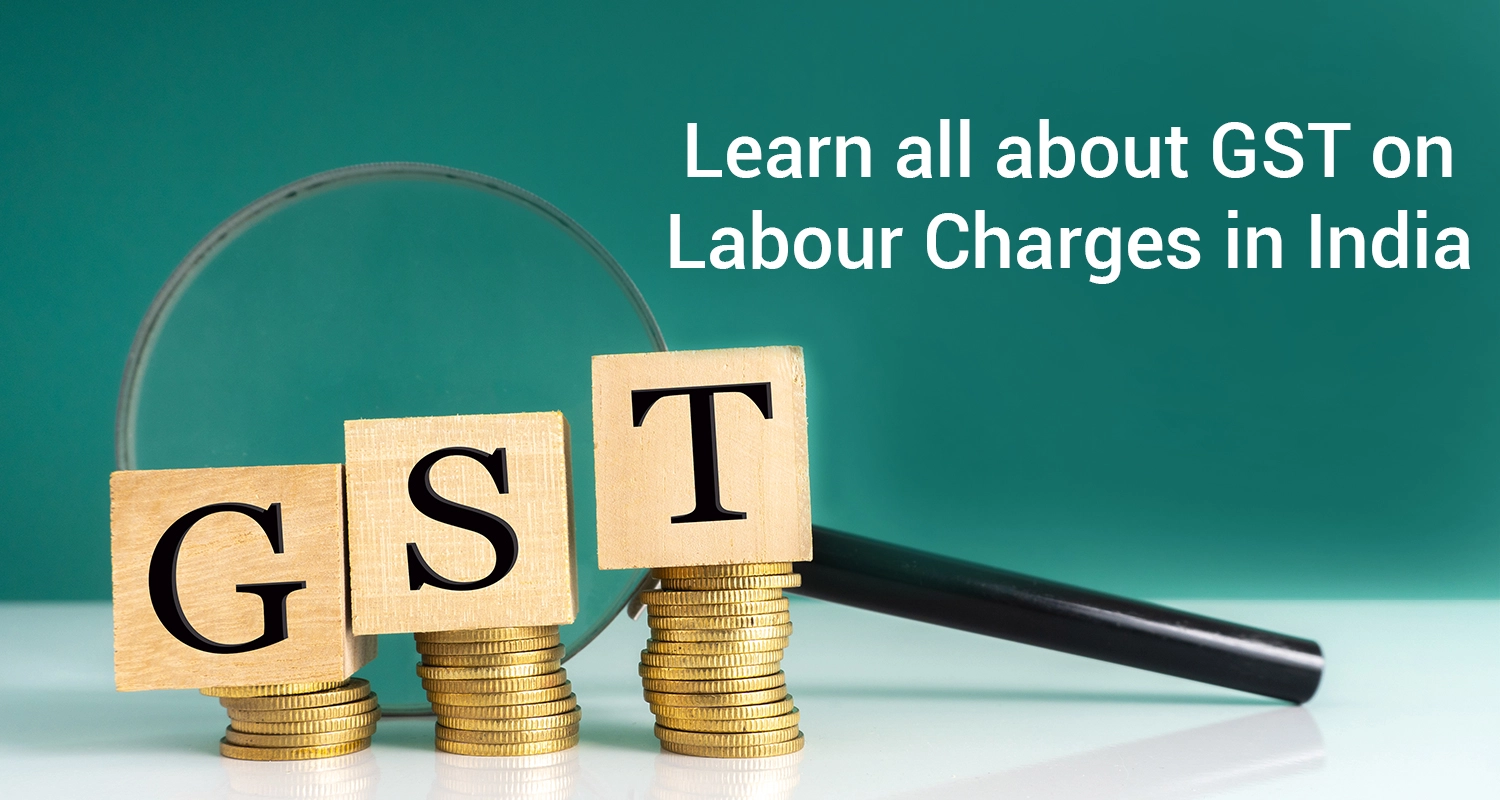GST on Labour Charges: Types of contract, Calculation, HSN Code, Implications & Exemptions

The term Goods and Service Tax exists for a reason. As per common knowledge it is believed that GST applies mostly to goods, but it also applies to services. We are talking about the manpower services offered by individuals or businesses. In other words, labour charges. It could be anything from data entry to housekeeping to security to driving to gardening. Getting to know how GST is applied to labour charges is important to both parties, the supplier as well as the recipient of the particular service.
Before we go in-depth into the GST applicable to labour charges in India, let’s first understand the types of Labour Contracts.
Types of Labour Contracts
There are 2 kinds of labour contracts:1. A labour contract containing only labour service: This type of labour contract involves pure labour service between the contractor/ service supplier and the recipient. Here the service provider is not eligible to use any materials procured by them during the provision of labour as mentioned in the Labour HSN code charges details.
Let’s understand this with an example. If Mr. A hires Mr. X to construct a building on a property owned by Mr. A under a pure labour contract, then Mr. X provides labourers for the assigned task and uses his own tools and machinery, whereas Mr. A will supply materials like cement, bricks etc. GST will be applicable only on the manpower being provided.
2. A labour contract containing material supply and labour: As defined under U/S 2(119) of the 2017 CGST Act, this type of labour contract is termed as a ‘works’ contract. It is a composite supply of labour services as well as materials and labour services are the main part of the contract. Even here, GST rates are applicable on manpower supply services.
We can take the same example as above. The difference here is that Mr. X provides everything, including manpower services, tools and machinery required by them, and materials like cement, sand, bricks etc.
How is Labour Charges GST Rate calculated?
As per the GST Act, the GST on Labour charges is calculated using the transactional value as the supply value. This transactional value includes all expenses, duties, and taxes levied under various statutory laws except for CGST, IGST, and SGST. Initially multiple expenses are borne by the recipient of the service rather than the supplier of the manpower. These types of services must be added to the total supply value, then the GST rate on labour charges is calculated as follows:
Basic amount for labour supply -₹100
A service charge at 10% on 100- Rs.10
EPF- ₹12
ESI- ₹4.75
Total- ₹126.75
GST is charged on the total amount- ₹22.8 (126.75*18%)
Sapna aapka. Business Loan Humara.
Apply NowLabour HSN Code and GST Rates
The HSN code for labour charges in India, also referred to as the service accounting codes with their services rendered and GST rates for labour contracts, is as follows:
| HSN Code | Nature of the Service | |
|---|---|---|
| 998511 | Retained/executive personnel search services | 18% |
| 998512 | Permanent placement services | 18% |
| 998513 | Contract Staffing Services | 18% |
| 998515 | Long-term staffing or payroll services | 18% |
| 998516 | Temporary staffing-to-permanent placement services | 18% |
| 998517 | Co-employment staffing services | 18% |
| 998518 | Other employment and labour supply services nowhere else classified | 18% |
Implications of GST on Labour Contractors
There are two scenarios
1. If the labour contractor is registered under GST:If the supplier agency is GST registered, then the agency is qualified to charge GST for labour supply. Plus, it can also claim the input tax credit for the same.
2. If the labour contractor is not registered under GST:In such a scenario, the service recipient should charge GST under reverse charge mechanism.
Exemptions available on GST Labour Charges in India
There are exemptions from GST for labour charges in certain situations. These exemptions apply to construction, erection, commissioning, and other related services provided under a pure labour contract. Here are the two scenarios:
Building an independent house or a single unit within a residential complex qualifies for this exemption.
Labour charges associated with construction, renovation, or repair under these government initiatives such as Pradhan Mantri Awas Yojana and Housing for All schemes are exempt from GST.
Conclusion
There are several advantages to getting yourself familiarized with GST on labour charges. It helps you to effortlessly categorize your services under the right GST rules, ensuring you are not burdened with potential penalties. With this knowledge, you can accurately calculate the GST amount for your labour supply, ensuring smooth business operations.FAQs
1. Is GST applicable on Labour Charges?Ans. Yes, GST is applicable to labour charges in India. It is applicable on manpower services on an individual basis or on behalf of businesses. This can include labour tasks such as data entry, construction, housekeeping, and driving among others.
2. What's the GST rate for pure labour contracts?Ans: Classified under HSN codes 998511 to 998518, pure labour contracts are subject to an 18% GST rate. It applies to the total value of the supply or the transactional value, which includes the labour charges and any other taxes like EPF and ESI.
3. How does the GST affect Labour Contractors?Ans. Implications of GST on Labour Contractors depend on their registration status - A registered contractor can charge GST and claim input tax credit, while unregistered ones have the GST charged by the service recipient under reverse charge mechanism.
Sapna aapka. Business Loan Humara.
Apply NowDisclaimer: The information contained in this post is for general information purposes only. IIFL Finance Limited (including its associates and affiliates) ("the Company") assumes no liability or responsibility for any errors or omissions in the contents of this post and under no circumstances shall the Company be liable for any damage, loss, injury or disappointment etc. suffered by any reader. All information in this post is provided "as is", with no guarantee of completeness, accuracy, timeliness or of the results etc. obtained from the use of this information, and without warranty of any kind, express or implied, including, but not limited to warranties of performance, merchantability and fitness for a particular purpose. Given the changing nature of laws, rules and regulations, there may be delays, omissions or inaccuracies in the information contained in this post. The information on this post is provided with the understanding that the Company is not herein engaged in rendering legal, accounting, tax, or other professional advice and services. As such, it should not be used as a substitute for consultation with professional accounting, tax, legal or other competent advisers. This post may contain views and opinions which are those of the authors and do not necessarily reflect the official policy or position of any other agency or organization. This post may also contain links to external websites that are not provided or maintained by or in any way affiliated with the Company and the Company does not guarantee the accuracy, relevance, timeliness, or completeness of any information on these external websites. Any/ all (Gold/ Personal/ Business) loan product specifications and information that maybe stated in this post are subject to change from time to time, readers are advised to reach out to the Company for current specifications of the said (Gold/ Personal/ Business) loan.



